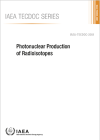Radioisotopes are the unstable form of an element that emit radiation to transform into a more stable form. Radiation is easily traceable and can cause changes in the substance it falls upon. These special attributes make radioisotopes useful in medicine, industry and other areas.
Radioisotopes
Of the 118 elements listed in the periodic table, only 94 occur naturally. While there are 254 stable isotopes, more than 3,000 radioisotopes are known, of which only about 84 are seen in nature. The radiation emitted is energetic and can be of different types, most often alpha (a), beta (b) and gamma (g).
Most radioisotopes are artificially produced in research reactors and accelerators by exposing a target material to “intense particles,” such as neutrons or protons, followed by different chemical processes to bring them into the required chemical form.
Radioisotopes are an effective tool used in radiopharmaceutical sciences, industrial applications, environmental tracing and biological studies. Aside from research reactors and accelerators, they are also obtained from radioisotope generators.
The quality of each and every radionuclide is a key factor for its development and application in medicine or industry. Producing high-quality radionuclides requires expertise and specialised facilities, which need to apply good manufacturing practices that use standard protocols with valid Quality Assurance and Quality Control (QA/QC) guidelines.
To take full advantage of the benefits that these radioactive products can offer, it is essential to not only have the necessary infrastructure in place but also qualified trained personnel. The IAEA helps Member States to achieve self-sufficiency in the production of radioisotopes and radiopharmaceuticals; strengthen quality assurance practices and regulatory compliance; and facilitates the development of human resources. The Agency has particularly assisted its developing Member States with the installation of radioisotope production facilities, from consultation to the choice of proper facilities and methods through to supervising the establishment of production centres.
The IAEA also prepares technical documents, guidelines and protocols on the production and QA/QC of various types of radioisotopes through coordinated research activities and technical meetings. In addition to offering technical advice on the correct and effective installation and maintenance of a suitable radioisotope infrastructure, it also proposes to Member States strategies for more future-oriented plans in this area.








